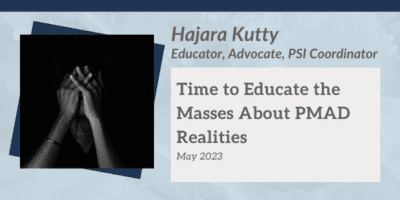Time to Educate the Masses About PMAD Realities

Trigger warning: this article contains mention of suicide and psychotic episodes.
He grew up playing with my daughter. I can still see her squinting in the sunlight to smile at the camera. As a young adult, he joined the Marines, fell in love with a fellow Marine and was honorably discharged after an injury. Then she got pregnant.
Last year this time, she died by suicide, leaving her baby behind. He seems to have a lot going on, including a new house, and a Master’s degree he’s working on.
Her family knows she’s depressed, but she’s seeing a therapist about it. A day before her life ended, she mentioned having thoughts of harming her baby. No one thought anything of it – he was in talk therapy after all.
After his death stories emerged of how he saw demonic floating heads and heard voices.
Her death, like the deaths of many this year including at least 13 children, is a clarion call for the work we still need to do as a postpartum community.
For decades, we have not hesitated to include reminders about the 1 in 1000 risk of developing blood clotting in the postpartum period. However, we fail to inform new parents about the 1-2 in 1000 risk of developing postpartum psychosis. It makes no sense considering what is at stake – the lives of mothers and the lives of their children. We need to actively start campaigning that families receive literature after giving birth including the risks of developing postpartum psychosis.
We also need to make sure we create awareness of how important it is to take strange behavior during the postpartum period seriously. Strange behavior or speech may be the only outward sign families see in a loved one suffering from postpartum psychosis. This is especially the case for women who choose to keep their hallucinations and delusions to themselves. The efforts around this don’t have to be particularly fancy to make the point. Consider what Action on Postpartum Psychosis, a UK charity group, did with a simple campaign asking: Does the new mother seem strange? Ask for help. It could be PP [postpartum psychosis]a treatable medical emergency.
While it’s wonderful that organizations are beginning to heed the calls of postpartum psychosis survivors to stop calling the condition rare, it’s simply not enough. It is true and important for people to know that most cases of postpartum psychosis are bipolar-based and occur in those with an underlying bipolar disorder. But it’s also key to recognize another uncomfortable truth: those who suffer from severe untreated postpartum depression can also develop psychotic features in their condition.
As a society, we fail all mothers and families when we discount the very real dangers of postpartum mood and anxiety disorders.
Let’s stop wasting valuable time and opportunity to educate people about postpartum psychosis. It’s time we stop letting it exist and acknowledge it – uncomfortable truths and all.
Because I for one, don’t want any more young mothers to fail.
Permission was obtained from the family for the use of this young woman’s story for this article.
About Hajara Kutty: Hajara Kutty is an educator, Muslim mental health advocate and a Support Coordinator with Postpartum Support International.





